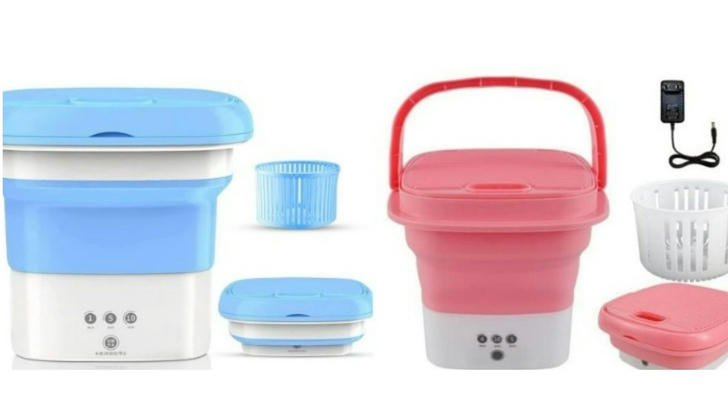Mini Washing Machines: Are These Compact Wonders the Future of Urban Living?
In today’s fast-paced, space-constrained urban lifestyle, convenience and efficiency are everything. As living spaces shrink and sustainability becomes a key concern, a new home appliance is quietly gaining massive popularity: the mini washing machine. Once considered a novelty, these compact devices are now being hailed as the next big thing in urban living.
But what exactly are mini washing machines, how do they work, and why are they suddenly in such high demand in 2025?
What Is a Mini Washing Machine?
A mini washing machine is a smaller, lightweight version of a traditional washing machine, designed primarily for small loads, portability, and minimal space usage. Unlike full-sized washers that require dedicated plumbing and installation, mini washers often:
- Plug into standard outlets
- Use minimal water and detergent
- Are portable and can be stored away
- Cater to apartments, RVs, dorms, and even travel use
They come in various models—from manual crank-based units to fully automatic digital machines with multiple wash cycles.

Why Are They Gaining Popularity in 2025?
1. Rising Urbanization & Smaller Homes
With apartment sizes shrinking in cities like New York, Tokyo, London, and Hong Kong, there's limited room for bulky appliances. Mini washing machines are perfect for micro-apartments, studio units, and shared housing environments.
2. Portability and Convenience
Many models are under 15 pounds and can be stored in closets, under sinks, or even carried on road trips. This makes them ideal for:
- Students
- Nomads and van-lifers
- People in temporary housing
- Seniors or individuals with mobility issues
3. Energy and Water Efficiency
Mini washers are eco-friendly by design. Most models use 70–90% less water and far less electricity compared to traditional washers. In an era where sustainability matters, these features are a huge selling point.
4. Cost-Effective
A full-sized washing machine can cost over $500 and consume considerable utilities over time. In contrast, a mini washing machine typically costs $50 to $150, with near-zero installation or maintenance costs. For people on a tight budget, this is a game-changer.
Top Features of 2025’s Best Mini Washing Machines
| Feature | Why It Matters |
|---|---|
| Automatic Wash & Spin Cycles | Just like a regular machine, but faster and more efficient. |
| Low Noise Operation | Important for small apartments or shared spaces. |
| Water Reuse Functionality | Reuses rinse water for the next load—ideal for eco-conscious users. |
| UV Sterilization | A feature in newer models to eliminate bacteria and odors. |
| Foldable or Collapsible Designs | Perfect for portability and storage. |
| Smartphone App Integration | Some high-end mini washers now connect to apps for cycle customization and usage tracking. |
Use Cases: Who Are Mini Washing Machines Perfect For?
1. Urban Singles & Couples
Doing a quick load of workout clothes, underwear, or baby items without going to a laundromat saves time and money.
2. Students in Dorms
Many college dorms now allow mini washers as an alternative to shared laundry rooms, offering privacy and safety.
3. Travelers & Campers
Portable mini washers can be used with 12V car adapters or solar panels, making them ideal for long road trips or remote living.
4. Parents with Babies
Washing cloth diapers or baby clothes multiple times a day becomes easier and more hygienic.

Mini Washer vs Traditional Washing Machine
| Criteria | Mini Washing Machine | Traditional Washing Machine |
|---|---|---|
| Size | Compact (under 2 cubic ft) | Large (3–5 cubic ft) |
| Portability | High | None |
| Installation | Plug-and-play | Plumbing required |
| Energy Use | Low | Moderate to High |
| Water Use | Very Low | High |
| Cost | $50–$150 | $400+ |
| Load Capacity | 2–7 lbs | 15–20+ lbs |
Challenges and Considerations
While mini washing machines are fantastic for many, they aren’t perfect for everyone.
- Not ideal for large families: If you regularly wash large loads, a mini washer won't keep up.
- Manual draining may be required: Some models don’t have automatic pumps.
- No dryer included: Most are wash-only or have a spin-dry option that doesn’t fully dry clothes.
That said, these "downsides" are often a fair trade-off for people prioritizing portability, affordability, and flexibility.
Best Mini Washing Machines of 2025
- LG PocketWash Ultra – Smart-enabled with auto-sterilization
- BLACK+DECKER CompactWash 3.0 – High load capacity with low noise
- KUPPET Twin Tub Washer – Dual wash-spin system for quick cleaning
- Lavario Portable Manual Washer – No electricity needed; ideal for off-grid
- Comfee MiniFold – Foldable model great for small apartments
The Future of Compact Living
As urban areas grow denser and more people prioritize sustainability, minimalism, and flexibility, mini washing machines represent more than just a household appliance. They symbolize a shift in how we think about daily chores and smart living.
In fact, some urban developers and co-living spaces in 2025 have started integrating shared mini laundry stations on each floor, replacing traditional coin-operated machines. This trend shows no sign of slowing down.
Conclusion: Are Mini Washing Machines the Future?
Absolutely—if not for everyone, then certainly for a growing segment of the population. Whether you're a minimalist, a student, a digital nomad, or just someone tired of lugging laundry to a shared washer, mini washing machines offer a smarter, cleaner, and more flexible solution.
In a world where space and time are premium, these compact wonders might just become a household staple for the next generation of urban dwellers.
